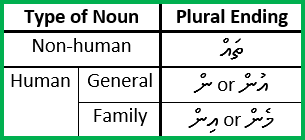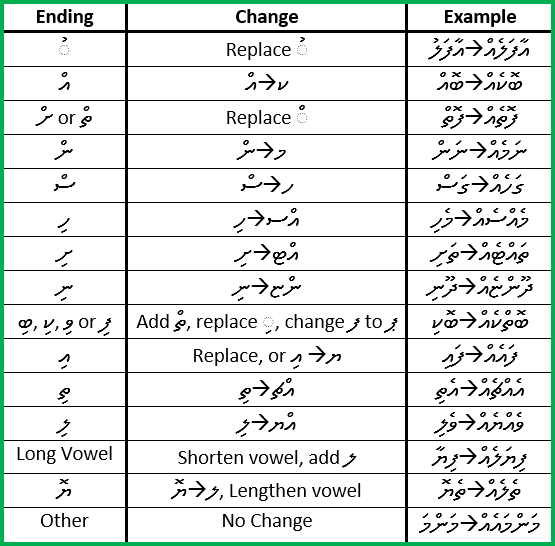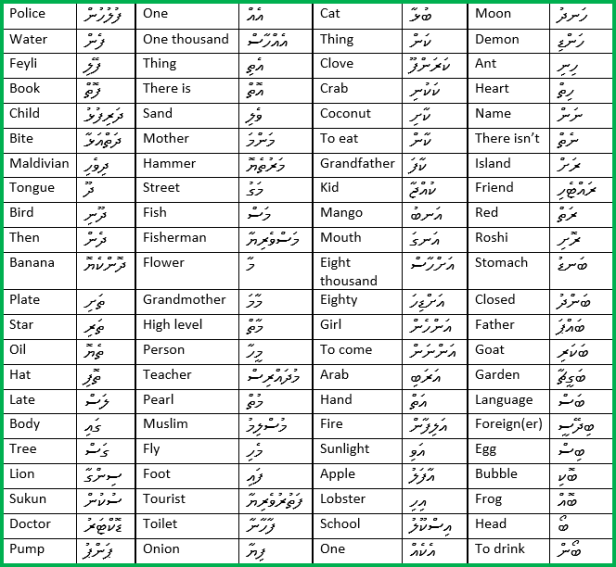In this lesson, we will look at how nouns are made indefinite and how they are made plural. This lesson will also give you your first batch of vocabulary words.
Forming Plural Nouns
We’ll start off with plurals as they are easier to learn than articles. There are two main plural suffixes in Dhivehi, and a third which is a variant of one of those. The one you use depends on whether the noun is human or non-human.
Non-Human Nouns
For non-human nouns, the suffix ތައް is added to the end. Consider the following nouns:
- އާފަލު – Apple
- ފޮތް – Book
- ދޫނި – Bird
- ތަރި – Star
- މަގު – Street
- ބުޅާ – Cat
Their plural forms are:
- އާފަލުތައް – Apples
- ފޮތްތައް – Books
- ދޫނިތައް – Birds
- ތަރިތައް – Stars
- މަގުތައް – Streets
- ބުޅާތައް – Cats
Human Nouns
For human nouns, the suffix ން or އުން is added to the end. Consider the following human nouns:
- މުދައްރިސް – Teacher
- ދަރިފުޅު – Child
- ބިދޭސީ – Foreigner
- ޑޮކްޓަރު – Doctor
- މުސްލިމު – Muslim
Their plural forms are:
- މުދައްރިސުން – Teachers
- ދަރިފުޅުން – Children (see comment below)
- ބިދޭސީން – Foreigners
- ޑޮކްޓަރުން – Doctors
- މުސްލިމުން – Muslims
The following words have irregular plurals:
- މީހާ – Person / މީހުން – People (see below)
- ކުއްޖާ – Kid / ކުދިން – Kids
- މަސްވެރިޔާ – Fisherman / މަސްވެރިން – Fishermen
- ފަތުރުވެރިޔާ – Tourist / ފަތުރުވެރިން – Tourists
Sometimes you will see plurals like these written with އީން instead of އިން (for example ކުދީން). The latter is more common and it is the way people pronounce the words.
If a word ends with ސް, it changes to ހ before ން is added:
- ދިވެސް – Maldivian / ދިވެހިން – Maldivians
- ފުލުސް – Police officer / ފުލުހުން – Police (officers)
- މީސް – Person (not used often by itself. މީހާ is more common) / މީހުން – People
Family Nouns
If a human noun refers to a family member, އިން or މެން can be added to the end:
- މަންމަ – Mother / މަންމަމެން ,މަންމައިން – Mothers
- ބައްޕަ – Father / ބައްޕަމެން ,ބައްޕައިން – Fathers
- މާމަ – Grandmother / މާމަމެން ,މާމައިން – Grandmothers
- ކާފަ – Grandfather / ކާފަމެން ,ކާފައިން – Grandfathers
The words މައިން and ބަފައިން also mean “mothers” and “fathers” respectively.
އިން is more formal and more “correct” for pluralisation than މެން, meaning that family nouns are not that different to other human nouns. In addition, މެން has another meaning which you will see in a future lesson.
It is possible to use ތައް instead of ން with human nouns. However, this has the effect of dehumanising the noun and can be quite insulting (like calling a person “it” instead of “he” or “she”). It is also possible to use ތައް and ން together to emphasise the fact that there are many people, for example މީހުންތައް or ކުދިންތައް. This does not have any dehumanising effect, and can be thought of as a plural of a plural.
Summary
The following table summarises when to use which plural marker:

Forming Indefinite Nouns
Dhivehi does not have a definite article (“the”), meaning that a noun by itself could mean “[noun]” or “the [noun]”. However, there is a suffix which is used to make nouns indefinite – the equivalent of using “a/an”. That suffix is އެއް, which by itself means “one”.
Many words change slightly when taking this suffix, depending on their endings. We’ll look at them one by one. (Brace yourselves, there are quite a few of these)
Words Ending with ު
Most Dhivehi words end with ު because, as you know from the previous lesson, only five letters can carry ް . The ު is replaced as though it is not part of the word.
- އާފަލު – Apple / އާފަލެއް – an apple (NOT އާފަލުއެއް)
- މަގު – Street / މަގެއް – a street
- ޑޮކްޓަރު – Doctor / ޑޮކްޓަރެއް – a doctor
- މުސްލިމު – Muslim / މުސްލިމެއް – a Muslim
Words Ending with އް
އް changes to ކ:
- ބޮއް – Frog / ބޮކެއް – a frog
- އެއް – One / އެކެއް – One (used when counting – more on this later)
Nouns ending with އް are not very common. However, the ކ – އް change is important to know as there are other more frequently occurring situations where it happens.
For those who know Malay or Indonesian, އް is kind of like the ‘k’ at the end of words like ‘jelek’ – it doesn’t make its own sound until a suffix is added, like in ‘kejelekan’. At the end of words, އް is actually ކް, but they are pretty much the same thing (they are both stop consonants) and that is why the change occurs.
Words Ending with ށް or ތް
ް is replaced, and the ށ or ތ is pronounced normally:
- ފޮތް – Book / ފޮެތެއް – a book
- އަތް – Hand / އަތެއް – a hand
- ރަށް – Island / ރަށެއް – an island
Words Ending with ން
ން becomes މ:
- ނަން – Name / ނަމެއް – a name
- ކަން – Thing (abstract, not physical) / ކަމެއް – a thing
But not in all cases:
- އަލިފާން – Fire / އަލިފާނެއް – a fire
- ފެން – Water / ފެނެއް – a (body of) water
The reason this does not occur in all words is that some words originally ended with ން while others originally ended with މް. The pronunciation of މް gradually changed to ން, but މ is still used if there are suffixes.
Words Ending with ސް
ސް changes to ހ:
- ގަސް – Tree / ގަހެއް – a tree
- ބަސް – Language / ބަހެއް – a language
- ބިސް – Egg / ބިހެއް – an egg
- މަސް – Fish / މަހެއް – a fish
- މީސް – Person (not used often by itself. މީހާ is more common) / މީހެއް – a person
Exceptions:
- ދިވެސް – Maldivian / ދިވެއްސެއް – a Maldivian
- މުދައްރިސް – Teacher / މުދައްރިސެއް or މުދައްރިއްސެއް – a teacher
- ރައްޓެސް – Friend / ރައްޓެއްސެއް – a friend
Words Ending with ހި
ހި becomes އްސ.
- މެހި – Fly / މެއްސެއް – a fly
- އިހި – Lobster / އިއްސެއް – a lobster
This category is related to the previous one, with some words having forms for both. For example, ދިވެއްސެއް is technically the indefinite of ދިވެހި, but ދިވެހި is an adjective, not a noun like ދިވެސް. The same applies to ރައްޓެސް, where ރައްޓެހި is an adjective (ރައްޓެހިން is the plural). You should note that words like ދިވެސް and ރައްޓެސް rarely occur without a suffix. Some might not even consider the latter to be a proper word.
Words Ending with ށި
ށި becomes އްޓ:
- ތަށި – Plate / ތައްޓެއް – a plate
- ކާށި – Coconut / ކާއްޓެއް – a coconut
- ރޮށި – Roshi (Maldivian flatbread) / ރޮއްޓެއް – a roshi
An irregular word where this change occurs:
- ބަކަރި – Goat / ބަކައްޓެއް – a goat
The word was originally ބަކަށި (people from the northern atolls say it this way). The ށި became ރި in the standard language.
Sometimes you will see these words written with ށް instead of އް (e.g. ރޮށްޓެއް). I would say that both spellings are equally common. Both are pronounced the same way.
Words Ending with ނި
ނި becomes ންޏ:
- ދޫނި – Bird / ދޫންޏެއް – a bird
- ހިނި – Ant / ހިންޏެއް – an ant
- ކަކުނި – Crab / ކަކުންޏެއް – a crab
Words Ending with ވި ,ކި ,ބި or ފި
ތް is inserted before the letter and the ި is replaced:
- އަރަބި – Arab (like ދިވެހި, this is technically an adjective) / އަރަތްބެއް – an Arab
- ބޮކި – Bubble or Lightbulb / ބޮތްކެއް – a bubble or a lightbulb
- އަވި – Sunlight / އަތްވެއް – a sunlight (this makes sense in Dhivehi)
- ތޮފި – Hat / ތޮތްޕެއް – a hat
Note how ފ changes to ޕ.
Words Ending with އި
ި is replaced:
- ފައި – Foot / ފައެއް – a foot
- ގައި – Body / ގައެއް – a body
Sometimes you will see the އ changed to ޔ (e.g. ފަޔެއް), although this is not as common.
Words Ending with ތި
ތި becomes އްޗ:
- އެތި – Thing / އެއްޗެއް – a thing
Words Ending with ލި
ލި becomes އްޔ:
- ވެލި – Sand / ވެއްޔެއް – a sand (this makes sense in Dhivehi)
- ފޭލި – Feyli (Traditional Sarong) / ފޭއްޔެއް – a feyli
Words Ending with a Long Vowel
Long vowel becomes short and ލ is added:
- މާ – Flower / މަލެއް – a flower
- ބޯ – Head / ބޮލެއް – a head
- ދޫ – Tongue / ދުލެއް – a tongue
Originally, the words would have ended with ލް, but the sound disappeared and changed into a long vowel in the standard language. In the southern atolls, you will still hear people say things like ފިޔަލް and ބޮލް.
This change does not apply to words which did not originally end with ލް:
- ބަގީޗާ – Garden / ބަގީޗާއެއް – a garden
- ފާހާނާ – Toilet / ފާހާނާއެއް – a toilet (usually pronounced ފާހާނައެއް/ފާހާނަ)
- ކުއްޖާ – Kid / ކުއްޖެއް – a kid (this one is irregular)
Words Ending with ޔޮ
ޔޮ is replaced with ލ, and in some cases the preceding vowel is lengthened:
- ތެޔޮ – Oil / ތެލެއް – an oil
- މަރުތެޔޮ – Hammer / މަރުތޭލެއް – a hammer
- ދޮންކެޔޮ – Banana / ދޮންކޭލެއް – a banana
Like in the previous category, these words originally ended with ލް.
Note that to say “a banana”, ދޮންކޭލެއް is not used as frequently as ދޮންކެޔޮ ވަކެއް. This is kind of like when people say “a piece of cake” in English.
Other Words
Words which do not fit into any of the previous categories simply take އެއް without any changes:
- މަންމަ – Mother / މަންމައެއް – a mother
- ބައްޕަ – Father / ބައްޕައެއް – a father
Summary
Use this table to help you remember how endings change:

These changes do not occur only with the indefinite suffix, they also occur when changing noun cases, and some other suffixes too. Therefore, it is very important to know how they work.
Plural Indefinite
The suffixes ތައް and އެއް can combine to form ތަކެއް (note the އ changed to ކ). When ތަކެއް is attached to a noun, it means there is a large, indeterminable number of that noun, and the group as a whole is indefinite. To get the same meaning in English, we use the word ‘some’ or another measure word. For example:
- ބުޅާތަކެއް – Some cats, a group of cats
- ފޮތްތަކެއް – Some books, a pile of books
- މެހިތަކެއް – Some flies, a swarm of flies
- ކާށިތަކެއް – Some coconuts, a bunch of coconuts
- މީހުންތަކެއް – Some people, a group of people
Adding ތަކެއް to a human noun has the same dehumanising effect as adding ތައް by itself.
Vocabulary
These are the words you have learnt so far (including from the previous lesson). Try to remember the ones you would use more frequently.


ދަރިފުޅުން – Children. wait . There is a clear misunderstanding. We neevr say dharifulhun, however we say dharin.
LikeLike
Thanks for pointing this out. You’re right that ދަރިން is more “correct”, but I have seen examples of ދަރިފުޅުން used in writing as well; not so much in speech though.
You could, however, make a case for ދަރިފުޅުން as a proper word since it is comparable to ބޭފުޅުން.
LikeLike